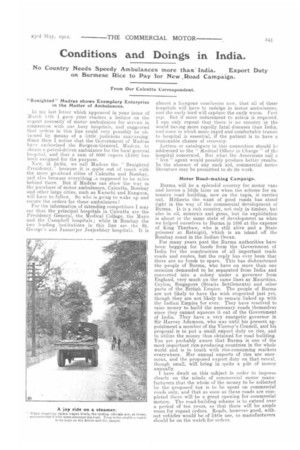Conditions and Doings in India.
Page 15

If you've noticed an error in this article please click here to report it so we can fix it.
No Country Needs Speedy Ambulances more than India. Export Duty on Burmese Rice to Pay for New ,Road Campaign.
From Our Calcutta Correspondent.
"Benighted" Madras shows Exemplary Enterprise in the Matter of Ambulances.
In my last letter which appeared in your issue of March I lth I gave your readers a lecture on the ulgent necessity of motor ambulances for service in connection with our busy hospitals, and suggested that orders in this line could very possibly be obtained by means of a little judicious canvassing. Since then I notice that the Government of Madras have authorized the Surgeon.General, Madras, to obtain a petrol-driven ambulance for the local general hospital, and that a sum of 6000 rupees (1:400) has been assigned for the purpose. Now, in India, we call Madras the " Benighted Presidency," because it is quite out of touch with the more go-ahead cities of Calcutta and Bombay, and also because everything Is supposed to be aides behind there. But if Madras can show the way in the purchase of motor ambulances, Calcutta, Bombay and other large cities, such as Karachi and Rangoon, will have to follow. So who is going to wake up and secure the orders for these ambulances?
For the information of intending competitors I may say that the principal hospitals in Calcutta are the Presidency General, the Medical College, the Mayo and the Campbell hospitals ; while in Bombay the two leading institutions in this line are the St. George's and Jamsetjee Jeejeebhoy hospitals. It is almost a foregone conclusion now, that all of these hospitals will have to indulge in motor ambulances, and the early bird will capture the early worm. Verb sap. But if more inducement to action is required, I can only repeat that there is no country in the world haying more rapidly fatal diseases than India, and none in which more rapid and comfortable transit. to hospital is essential, if the patient is to have a reasonable chance of recovery.
Letters or catalogues in this connection should b:! addressed to the " Medical Officer in Charge " of th hospital concerned. But what the Americans call a " live " agent would possibly produce better results. In the absence of any such aid, commercial motor literature may be permitted to do its work.
Motor Road-making Campaign.
Burma will be a splendid country for motor vans and lorries a little later on when the scheme for extensive road building, now on the tapis, is carried out. Hitherto the want of good roads has stood right in the way of the commercial development of Burma. It is a rich country, not only in timber, but also in oil, minerals and gems, but its exploitation is about in the same state of development as when we helped ourselves to Burma in 1886 at the expense of, King Theebaw, who is still alive and a State prisoner at Ratnigiri, which is an island off the Bombay coast in the Indian Ocean. For many years past the Burma authorities have been begging for funds from the Government of India for the construction of all important trade roads and routes, but the reply has ever been that there are no funds to spare. This has disheartened the people of Burma, who have on more than one occasion demanded to be separated from India and converted into a, colony under a governor from England, very much on the same lines as Mauritius, Ceylon, Singapore (Straits Settlements) and other parts of the British Empire. The people of Burma are not likely to have the wish respected just yet, though they are not likely to remain linked up with the Indian Empire for ever. They have resolved to raise money to build the necessary roads themselves since they cannot squeeze it out of the Government of India. They have a very energetic governor in Sir Harvey Adamson, who was until his present appointment a member of the Viceroy's Council, and his proposal is to put a small export duty on rice, and to utilize the money thus obtained for road building. You are probably aware that Burma is one of the most important rice-producing countries in the whole world and is in touch with rice-consuming markets everywhere. Her annual exports of rice are enormous, and the proposed export duty on that cereal, though small, will bring in quite a pile of money annually. T have dwelt on this subject in order to impress clearly on the minds of commercial motor manufacturers that the whole of the money to be collected by the proposed tax is to be spent on commercial roads only, and that as soon as these roads are completed there will be a great opening for commercial motors. The road-building scheme is to extend over a period of ten years, so that there will be ample room for repeat orders. Roads, however good, without vehicles would be of little use, so manufacturers should be on the watch for orders.






















